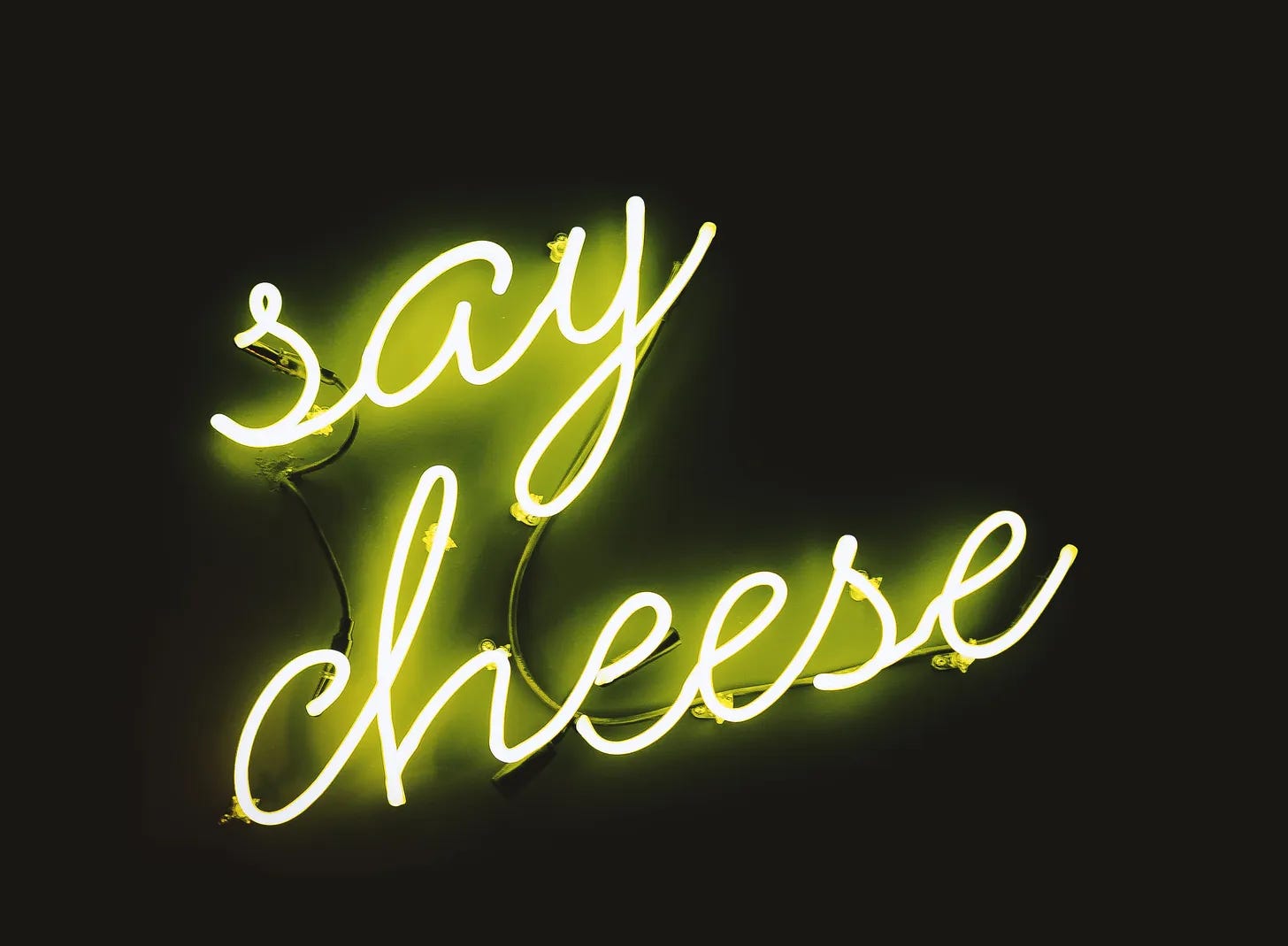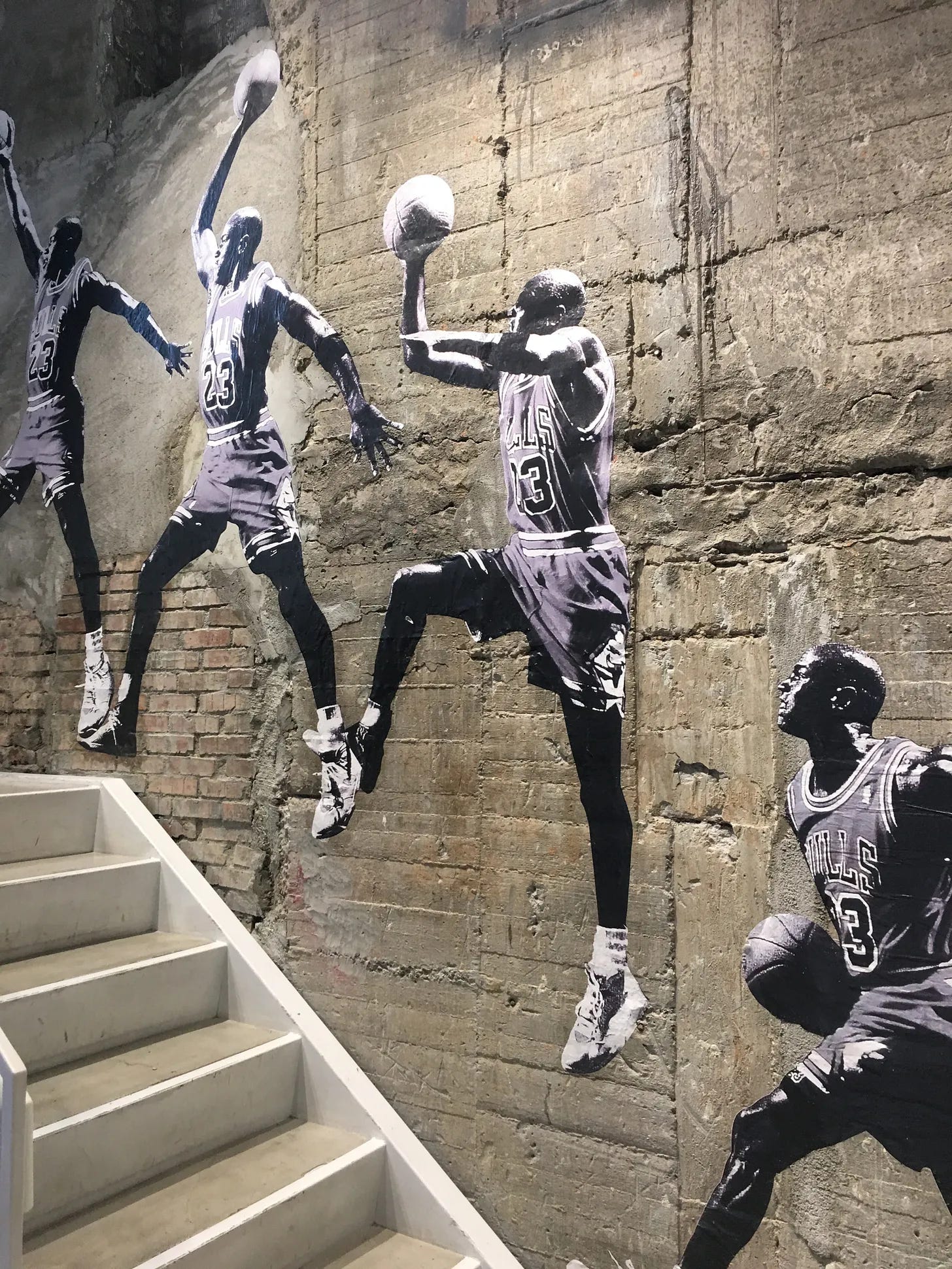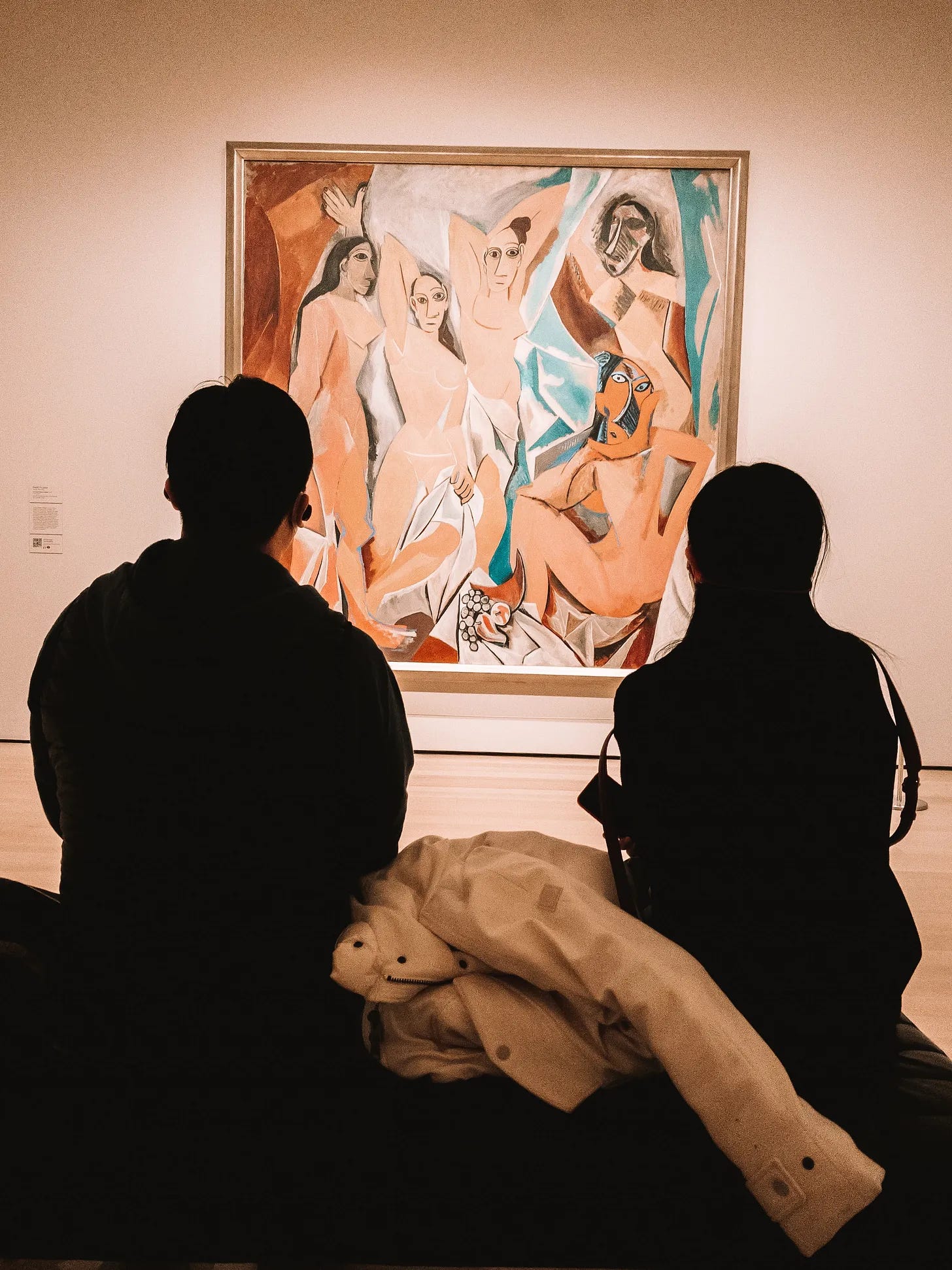The 9 Superpowers: Which One is Yours?
Plus, how to keep AI from taking over our jobs.
Forgive this rerun from 2023. I’ve got some guests in town and they keep bugging me to take them out to eat or, you know, feed them something. That, or their increasingly shrill pleas for me to take their son to the clinic after he sustained a massive head wound when he tripped and fell into my oak credenza. Sheesh. As such, I’m a little f-ing distracted and didn’t have the necessary concentration to come up with something new. Sorry.
“Cheese!”
Yeah, that’s right, I started this article by yelling “Cheese.”
Maybe the oldsters among you think I’m afflicted with what Curly of the 3 Stooges had. He was periodically beset by demons and went into violent frenzies that could only be stopped by stuffing cheese into his mouth, usually limburger (“Moe-Larry, cheese!!”).
Good guess but yelling “cheese!” at random intervals or inappropriate times is actually how I think we’re going to prevent AI from making writers of all kinds – along with practically everybody else -- obsolete.
It’s already conceivable that AI will soon be able to perfectly emulate the writing style of almost any generic writer, but especially worrisome is that it might soon be able to to perfectly emulate those whose style is so distinct that’s it like a set of fingerprints, writers/poets like Hemingway, Emily Dickinson, Tom Wolfe (the gonzo journalist and not the Look Homeward Angel guy), Mickey Spillane, Cormac McCarthy, and hundreds of others.
Who’ll need real-life writers when any schmuck will someday be able to tell AI to create a story in the manner of Ernest Hemingway, only this time with Jake Barnes’ manhood intact and instead of being a journalist in love with Lady Brett Ashley, he runs a weed dispensary and he’s got a thing for Lizzo?
It could happen.
Science fiction already predicted a version of this sort of thing years ago. During an episode of Star Trek: TNG, Geordi, in an attempt to give Data a challenge he could sink his molybdenum-cobalt alloy teeth into, tells the holodeck to create, in a Sherlock Holmesian manner, a character that could defeat Data. Thus is a preternaturally powerful and brilliant Moriarty born who ends up taking over the Enterprise. Chaos ensues.
So, if you want to avoid AI versions of Moriarty, Lord Voldemort, Hans Gruber, Anton Chigurh, Anne Hathaway, or other people who are evil personified from taking over your starship, house, apartment, or pied-a-terre, you’d be wise to yell cheese and yell it often.
This whole “cheese” strategy presented itself to me last week when I was re-reading Kurt Vonnegut’s book, Breakfast of Champions.
If you’ve read any Vonnegut, you’re no doubt familiar with his fictional character, Kilgore Trout. Trout was a largely unsuccessful writer of paperback science fiction books and Vonnegut would often offer the plots of Trout’s books as parables.
The fictional Kilgore Trout book in question, titled Now it Can Be Told, tells the story of the Creator of the Universe who, on a lark, decided to create a creature with the ability to have free will. Every other creature in the world, though, is a fully programmed robot.
The creator never knew what the man (he doesn’t have a name) was going to say or do. Once, after taking a swim in some icy water, the man scrambles up some rocks to get out of the water and yells “Cheese!”
Another time he yelled, “Wouldn’t you really rather drive a Buick?”
The creator is understandably dumbfounded.
There’s much more to this fictional fictionalized short story, but the upshot is that the man’s free will, his capricious actions, his unpredictable statements, confused the Creator and kept him off-balance, which is exactly how we battle AI.
So I say cheese to you, AI, cheese! Or “pork chop,” or in the words of Outkast, “Fuck it, we chicken nugget.” Anything non-sensical will do.
If we do it often enough, or things like it often enough, in the real, non-Kilgore Trout world, we too can maybe prevent AI from seeing patterns in our writing style or behaviors in general and AI will remain a boring but useful tool, something to write legal briefs or journalistic filler on the comings and goings of Prince Harry and Meghan Markle.
Okay, I’m only half-serious. Even so, it’s something I try to keep in mind when I tickle my computer keyboard. I try to write in a manner that I think would be difficult or awkward for AI to imitate, or at least cause some of its algorithms to give the computer equivalent of gastric reflux.
Take, for instance, the entire intro to this article. It’s sort of what Alfred Hitchcock would have called a MacGuffin. The term refers to a device that Hitchcock used to advance the plots of his movies. It sets the characters into motion but it’s really a red herring, i.e., it makes you look left when you should have looked right.
While the MacGuffin seems like it has real importance to the character and to me, the author, it really has no significance at all.
MacGuffins, you see, might also be challenging for AI to duplicate.
In this case, my MacGuffin – the entire “cheese” strategy – is at least remotely related to my original topic, and that topic is talent or, if your prefer, superpower, in others that inspires me and gives me a glimpse of divinity. I seek out these talents like a Southern man seeks out grits.
Perhaps surprisingly, it’s all around us and it can be found in the most mundane places.
I don’t care if I’m watching a short-order cook flip pancakes; if they’re good at it, can send the pancakes flip-flopping skywards only to stop just shy of sticking on the ceiling and tumble down again onto a hot griddle, it makes me smile and feel I’m in touch with the divine nature of the universe. (Not that a sweaty guy in a batter-stained tank top is an emissary of God, but you get the picture.)
Oddly, our society doesn’t always reward talented people for doing what they’re good at. As such, they’re often hard to spot. I sometimes have to search under occupational rocks to find these talents.
There are plenty of people, though, whose talents are easily discernible because their talents are marketable and highly visible. Take sports, for instance. I never really gave much of a rat’s ass about basketball, but I never missed watching Michael Jordan play (or Lebron or Curry or whomever is currently scaling Jordan-esque heights).
There was such artistry in the way the guy(s) played with the ball, played away from the ball, and played with his opponents’ heads that it’s a goddam pity that it’s so ephemeral, so vulnerable to time that eventually devours everything.
I felt the same way watching Muhammad Ali or Gretzky. I feel the same way now watching Patrick Mahomes and some of his contemporaries. I can’t take my eyes of Simone or Serena. I watch Ohtani or Fernando Tatis Jr. and I’m wide-eyed because of their diverse skills that have elements of ballet in them.
Perhaps surprisingly, I don’t revere runners, swimmers, golfers, or competitive divers in the same way. There’s too much rote in what they do. I’ll give you another example from the Vonnegut book I mentioned earlier. A character named Karabekian is told that Mary Alice Miller, the fifteen-year-old Two Hundred Meter Breaststroke Champion of the World, was taught by her father to swim when she was eight months old.
Karabekian asks, “What kind of man would turn his daughter into an outboard motor?”
I sort of concur. These types of athletes master the same movement or stroke or action and they do it repeatedly until they’re more robot than human. While their precision and endurance and dedication are impressive, it lacks, at least to me, a certain artistry and it fails to give me the glimpse of the divine that I jones for.
It makes me sad to see kids (or even adults) turned into outboard motors, or running, diving, or swinging machines. Look at it this way: Can you be considered a good dancer if the only dance you can do is the Viennese Waltz? (But feel free to berate me in the comments section below.)
But sport’s hardly the sole domain of talent. We need to give equal or greater appreciation to those that appeal to our souls, our spirit, rather than our adrenal glands. Among these are the writers, musicians, artists, and architects. The Nabokovs and the Wolfes, the Mozarts and the Lennons, and even the Jay-Zs or Eminems, along with the Picassos and the Gehrys, and even screen writer Aaron Sorkin. The stuff they’ve done is every bit as uplifting as anything physical I’ve witnessed.
The list is gloriously long.
Most of the people who earn our awe are well compensated, i.e., successful, at least in conventional terms. The trouble is some people are reading their success all wrong. They’re equating their monetary rewards as their true success and not necessarily what they do or what they give to humanity.
Ol’ Ralph Waldo Emerson described these pinheads perfectly:
"They measure their esteem of each other by what each has, and not by what each is."
And the world is full of these people, the occasionally well-compensated shitheads and the often woefully under compensated but enormously talented artists, the Michael Jordan’s of some other, less glamorous world.
I use the word "artist" because that’s what all talented individuals are. Medicine practiced well is an art, as is engineering. Hell, doing a tax return well is an art form, as is baking a damn pie.
Psychologist Howard Gardner took my musings a lot further and came up with 9 types of intelligence – superpowers, if you prefer – that map out an individual’s strength and weaknesses:
1. Logical-Mathematical Powers – This one’s self-explanatory. These are the types of people who can do the advanced Sudoku puzzles annoyingly fast and can quickly calculate the tip on a restaurant check.
2. Linguistic Powers – This superpower simply means you have an affinity with words and maybe have a bit of the poet in you. This trait is often seen in successful writers, journalists, radio announcers, salesman, and lawyers.
3. Interpersonal Powers – This one means you have empathic powers, i.e., you’re sensitive to the feelings of other people. You’re likely to be able to sense much more quickly than others that the man sitting next to you on the subway is an axe murderer, which is indeed a fine superpower to have. People with this ability often find themselves working in human resources, counselling, management, or as teachers, psychologists, or social workers.
4. Intrapersonal Powers – These types of people are supremely aware of their own feelings and motivations, which is pretty rare. It also allows them to treat other people the way they want to be treated themselves. A good occupation for them is friend. Other than that, they seem to gravitate to psychology, therapy, social work, theology, or even poet.
5. Musical Powers – These people have the hearing sensitivity of an Airedale. They know rhythm, pitch, tone, and timbre. They’re likely hugely annoyed by the tinny, monophonic speakers most of us accept without complaint and they can hear the refrigerator beeping several rooms away when the rest of us are oblivious. Natural occupations include musician, conductor, DJ, music therapist, or piano (or whatever) teacher.
6. Visual-Spatial Powers – Remember those annoying 3D computer generated images that you had to stare at for an insufferably long time to see the dragon or spaceship? People with this kind of superpower can spot them lickity-split. They’re also likely to be able to easily manipulate images in their mind and are good at thinking about objects in 3D. In other words, they make good artists, or architects, graphic artists, or even interior decorators.
7. Bodily-Kinesthetic Powers – Athletes. Dancers. Or even carpenters. Certain porn stars. Good at using the body in general.
8. Naturalist Powers – You’re likely a horse whisperer, or dog, cat, gopher, or whatever whisperer. You feel a strong kinship to nature. You might also have a green thumb. You might find joy in being an oceanographer, botanist, zoologist, astronomer, or weed farmer.
9. Existential Powers – You remember when you used to get high in high school with a bunch of friends and someone would ask, “Hey, what does color taste like?” Well, if that person was you, you likely have existential intelligence as your superpower. You like pondering the imponderables of life. You want to know the meaning of life and spend a lot of time thinking about what happens after death. You’d likely find satisfaction in being clergy, a philosopher, inspirational speaker, or kind of a downer writer.
By the Hammer of Thor…
I like to think that writing is my talent, my superpower. So, call me “Linguistic Man.” The symbol on my uniform is a Wordle and my spandex trunks are peppered with palindromes like “Was it a rat I saw?” and “No lemon, no melon.” I strike fear in the hearts of the poorly read or illiterate.
That brings me back to other talents/superpowers that are relatively mundane and doesn’t easily slip into one of Gardner’s classifications.
Consider my friend, Franz. He was raised in Communist East Germany before the wall came down. Franz didn’t know who his parents were and even when his birthday was. Today, Franz owns a small coffee shop in Southern California where he serves sandwiches and pastries that he bakes himself and if anyone ever turned owning a coffee shop into an art form, it’s Franz.
Franz makes it a point to know every customer’s name and what they drink. He knows what they do for a living and how many kids they have. If a new business comes into town, he’ll send over 20 free coffees. A few hours later, he’ll send over some of the pastries he makes at 4:30 in the morning, followed by some more coffees. He’ll even deliver a coffee to your house if you’re under the weather, and if there’s a charity event in town, he’ll wheel over his portable espresso machine and donate his time.
The result? A coffee shop that’s become the social hub of the town, a place where people know each other and talk to each other and feel comfortable. What’s more, there’s always a line out the door and the cash register trills all day long like the phones at Ticketmaster when Taylor Swift comes to town.
Ever wonder why so many places go out of business? Because the owners didn’t turn running the business into an art form. They don’t have the superpower that Franz does.
To All the Patrick Mahomes in Hiding
I’ve got this theory about talent and artistry and superpowers in general. I’m cognizant of Gardner’s innate categories of ability and intelligence, but they don’t blossom in some people like they should.
For instance, I feel that to be good at some things, you have to have read everything... or read nothing. Alternately, you have to have tried all styles, methods, and strategies… or no other styles, methods, or strategies. Only then is the mind unfettered by convention, unfettered by the work or thoughts of others and only then can you do truly original, truly artistic work.
Maybe that analysis is a little too binary, a little to black and white, but I need it to be so to make a point.
For instance, I’ve seen uneducated garage mechanics pick up a blowtorch and start creating incredible and totally original pieces of art with discarded metal. However, had they studied the works of just a handful of others, they might have been influenced just enough to stifle their natural instincts and end up creating Frankenstein crap.
But by not reading anything or being tutored by a single source, they’re fresh. They can’t imitate or copy or conform because they haven’t seen anything else.
Perhaps surprisingly, the guy on the other end of the spectrum -- the guy who studies for years and years can also tackle art with a fresh perspective because he’s been influenced by everybody but can still emerge from all that influence as fresh and innocent as the novice.
Picasso is an example of the latter. He studied conventional art, learned to paint objects as if his eye was merely a camera lens. However, as the years went by, his sensibilities left all that influence behind, and he started creating totally fresh artwork the likes of which had never been seen before.
I believe this lessen can transfer over to almost any occupation, any line of work. Obviously, a doctor or engineer or scientist has to study the rules, but once he knows them it takes a little imagination and a lot of courage to turn that talent into art. To quote Emerson again, "Whoso would be a man, must be a nonconformist."
I also think that everybody has some kind of talent, some little piece of divinity that is theirs alone. Too often, though, this talent is hidden, undiscovered, or squelched by people with influence who denigrate that talent as not being marketable.
At the risk of sounding cheerleaderish, you have talent; you have superpowers and artistry that deserves to be cultivated. It might require you to embrace nonconformity, to eschew imitation, but it’s there. It might require a shot of confidence, bravery, or a good old-fashioned kick in the pants to bring it out, but you owe it to yourself to figure out what it is.
Most of all though, you owe it to the rest of us so we can enjoy it and benefit from it, you Patrick Mahomes in-hiding, you.
Cheese!
###







